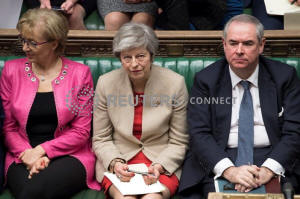|
Brexit in disarray: May under pressure to
go for soft Brexit
 Send a link to a friend
Send a link to a friend
 [April 01, 2019]
By Kylie MacLellan and William Schomberg [April 01, 2019]
By Kylie MacLellan and William Schomberg
LONDON (Reuters) - Britain's exit from the
European Union was in disarray after the implosion of Prime Minister
Theresa May's Brexit strategy left her under pressure from rival
factions to leave without a deal, go for an election or forge a much
softer divorce.
After one of the most tumultuous weeks in British politics since the
2016 referendum, it was still uncertain how, when or even if the United
Kingdom will ever leave the bloc it first joined 46 years ago.
The third defeat of May's divorce deal, after her pledge to quit if it
was passed, left one of the weakest leaders in a generation grappling
with a perilous crisis over Brexit, the United Kingdom's most
significant move since World War Two.
Parliament will vote on different Brexit options on Monday and then May
could try one last roll of the dice by bringing her deal back to a vote
in parliament as soon as Tuesday.
But May's government and her party, which has grappled with schism over
Europe for 30 years, was in open conflict.

May's own enforcer in parliament said that the government should have
been clearer that May's loss of her majority in parliament in a botched
bet on a snap 2017 election would "inevitably" lead it to accept a
softer Brexit.
"The government as a whole probably should have just been clearer on the
consequences of that," Julian Smith, known as the chief whip, told the
BBC in an interview published on Monday.
"The parliamentary arithmetic would mean that this would be inevitably a
kind of softer type of Brexit," said Smith, who also said ministers had
tried to undermine the prime minister.
Their behavior, he said, was the "worst example of ill-discipline in
cabinet in British political history".
Many in May's party, though, want a much more decisive split with the EU
than May was proposing. The Sun newspaper said 170 of her 314
Conservative lawmakers had sent her a letter demanding that Brexit take
place in the next few months - deal or no deal.
BREXIT IN MELTDOWN
In the June 23, 2016 referendum, 17.4 million voters, or 51.9 percent,
backed leaving the EU while 16.1 million, or 48.1 percent, backed
staying. But ever since, opponents of Brexit have sought to soften, or
even stop, the divorce.
The Times newspaper said May had been warned by some senior ministers
that she faced resignations if she agreed to pursue a softer Brexit.
[to top of second column]
|

British Prime Minister Theresa May, Conservative Party's leader of
the House of Commons Andrea Leadsome and Britain's Attorney General
Geoffrey Cox look on at the House of Commons in London, Britain
March 29, 2019. ©UK Parliament/Mark Duffy/Handout via REUTERS

Britain was due to leave the EU on March 29 but the political
deadlock in London forced May to ask the bloc for a delay.
Currently, Brexit is due to take place at 2200 GMT on April 12
unless May comes up with another option.
The tumultuous Brexit crisis has left the United Kingdom divided:
supporters of both Brexit and EU membership marched through London
last week. Many on both sides feel betrayed by a political elite
that has failed to show leadership.
Parliament is due to vote at around 1900 GMT on Monday on a range of
alternative Brexit options selected by Speaker John Bercow from nine
proposals put forward by lawmakers, including a no-deal exit,
preventing a no-deal exit, a customs union, or a second referendum.
"There are no ideal choices available and there are very good
arguments against any possible outcome at the moment but we are
going to have to do something," said Justice Secretary David Gauke,
who voted in the 2016 referendum to stay in the EU.
"The prime minister is reflecting on what the options are, and is
considering what may happen but I don't think any decisions have
been made," he told BBC TV. "We are clearly going to have to
consider very carefully the will of parliament."
With no majority yet in the House of Commons for any of the Brexit
options, there was speculation that an election could be called,
though such a vote would be unpredictable and it is unclear who
would lead the Conservatives into it.

The Conservative Party's deputy chair, James Cleverly, said it was
not planning for an election. But the deputy leader of the
opposition Labour Party, Tom Watson, said his party was on election
footing.
Opponents of Brexit fear it will make Britain poorer, less open and
divide the West as it faces the rise of China and growing
assertiveness of Russia.
Supporters cast Brexit as a chance to break free from a doomed
experiment in European unity they believe is falling behind the
other great powers of the 21st Century.
(Writing by Guy Faulconbridge)
[© 2019 Thomson Reuters. All rights
reserved.]
Copyright 2019 Reuters. All rights reserved. This material may not be published,
broadcast, rewritten or redistributed.
Thompson Reuters is solely responsible for this content. |